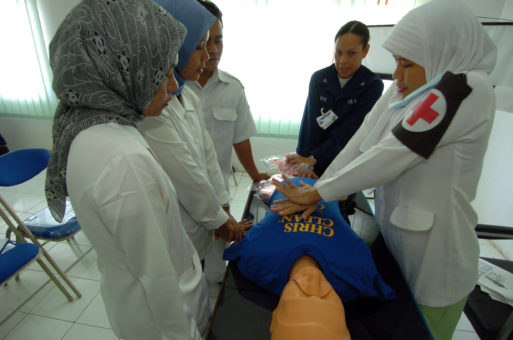
Credit: Wikimedia.org
More patients are taking control of their healthcare wishes than ever before, using advance directives to customize their end of life experiences. While this freedom of choice has given patients more power, doctors warn that some personalized options could do more harm than good.
Patients who choose partial DNRs (Do Not Resuscitate orders) might not receive the full level of care they need, and this can result in unforeseen consequences. Traditionally, a full DNR means that doctors cannot perform or administer:
- Manual chest compressions
- Mouth-to-mouth resuscitation
- Machine ventilation
- Intubation (in which the doctor inserts a tube into the patient’s mouth or nose)
- Emergency medications
- Cardioversion (using an electric shock to bring the heart back to a normal rhythm)
Some of these orders are more invasive than others, which is why many patients are opting to keep just a few on the list. Rather than rejecting all medical interventions, the patient might decide to keep manual chest compressions and mouth-to-mouth resuscitation as back-up options. The idea is that these less-invasive procedures could extend life without disrupting the patient’s comfort and quality of life.
In reality, however, many doctors find that partial DNRs harm patients and traumatize the medical staff. Dr. Paul Rousseau says he once treated an advanced-stage cancer patient who had a partial DNR — the patient wanted doctors to perform CPR if his heart stopped, but he didn’t want intubation. He was worried that the intubation would be painful and he would be unable to communicate with his family.
When he went into cardiac arrest, doctors dutifully performed CPR and got his heart back to a steady rhythm, but without intubation, they did not get enough oxygen into his lungs. His oxygen levels dropped, causing significant brain damage. Soon after, the patient slipped into a coma that lasted two weeks and died. He never had the opportunity to speak with his family one last time.
Problems such as these have prompted some doctors to push for fewer customization options for patients. They believe that patients should either choose a full DNR or allow the medical staff to do everything they can to save them. Their hope is that this would lower the risk of long-term suffering. When the time comes, patients would either die naturally without medical intervention or get the best medical care and the best chance of full recovery possible.

Credit: freestockphotos.biz
However, other experts believe that taking away a patient’s right to choose will set a dangerous precedent. Dr. Patrick Cullinan told Reuters that partial DNRs give patients and their families a sense of empowerment in an otherwise hopeless situation. He says it’s important for doctors to educate patients about what is involved in each aspect of a DNR order, and whether alternatives are available. For instance, intubation is a painful and inconvenient intervention, which is why Dr. Cullinan often uses bag masks instead of intubation in these scenarios. The masks are less invasive, yet they can often drive much-needed oxygen into the lungs.
If you or a loved one are considering a partial or full DNR, carefully research what is involved in each procedure and make a list of what is important to you. Do you want to communicate with your family above all else? Do you want to be as alert as possible? Do you simply want to be comfortable? When you communicate these needs with your medical staff, they can help you decide which orders will help you reach your goals, and which you’re better off without.

 Do Partial DNRs Increase the Risk of Suffering?
Do Partial DNRs Increase the Risk of Suffering?


 Our Monthly Tip: Make an “In Case of Death” File to Ease Loved One’s Grief
Our Monthly Tip: Make an “In Case of Death” File to Ease Loved One’s Grief

















Incredibly thought-provoking! ‘Partial DNRs Increase the Risk of Suffering?’ delves into a crucial aspect of healthcare decisions, prompting reflection.
Report this comment